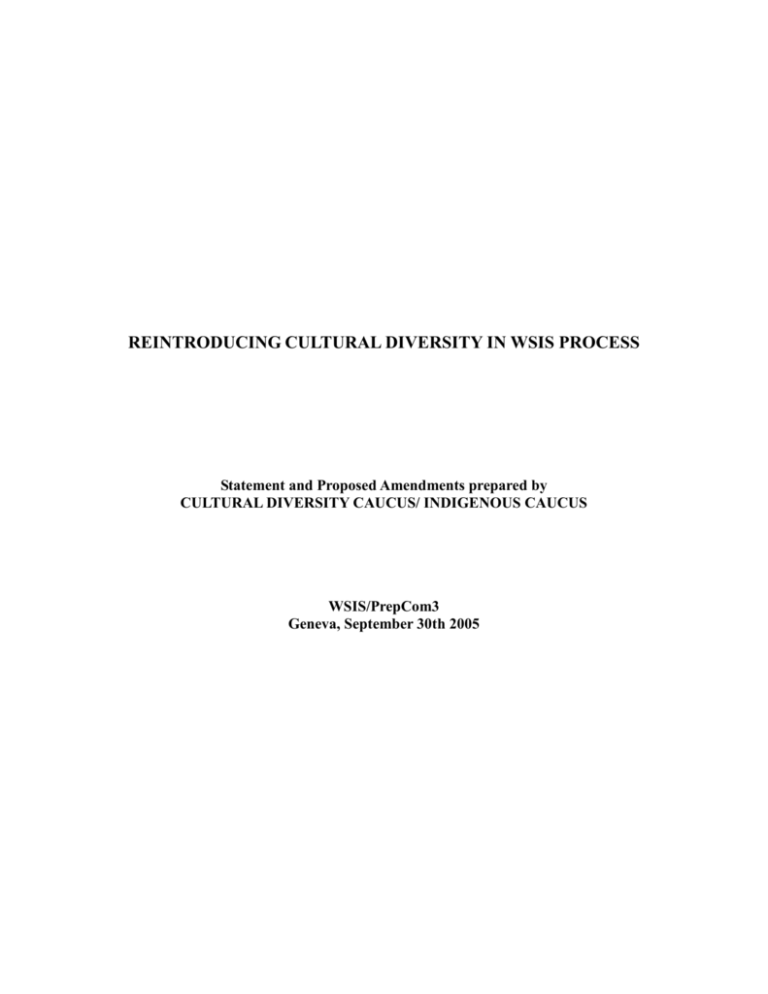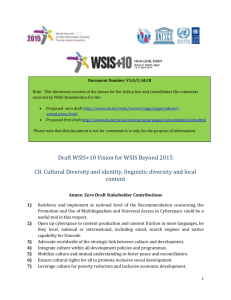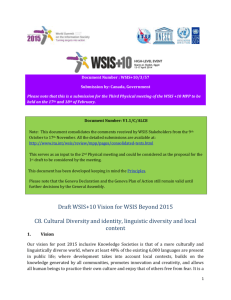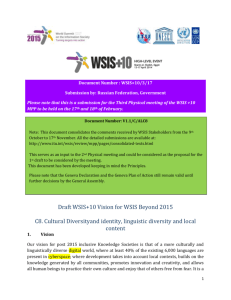REINTRODUCING CULTURAL DIVERSITY IN WSIS PROCESS
advertisement

REINTRODUCING CULTURAL DIVERSITY IN WSIS PROCESS Statement and Proposed Amendments prepared by CULTURAL DIVERSITY CAUCUS/ INDIGENOUS CAUCUS WSIS/PrepCom3 Geneva, September 30th 2005 What is cultural diversity? Cultural Diversity is the variety of human cultures in a specific region, or in the world as a whole. Source: Wikipedia The declaration of cultural diversity by Unesco defines cultural diversity as follows: Culture takes diverse forms across time and space. This diversity is embodied in the uniqueness and plurality of the identities of the groups and societies making up humankind. As a source of exchange, innovation and creativity, cultural diversity is as necessary for humankind as biodiversity is for nature. In this sense, it is the common heritage of humanity and should be recognized and affirmed for the benefit of present and future generations. Why is it important to reintroduce cultural diversity in the WSIS process? Let us first recognise that the existence of the many communities, peoples, regions, issues and themes represented throughout civil society and all stakeholders, are an expression of cultural diversity. By analyzing the WSIS process it may be noticed how definitions and actions on cultural diversity were gradually being left aside. Texts aimed at the promotion of cultural diversity included in the WSIS Declaration of Principles 1 were lost amidst the fulfilment process of these general goals, both at global level - Geneva Plan of Action 2 - as in Regional Action Plans3. Lack of interest and commitment on cultural diversity There has been neither real interest nor conviction within the WSIS process of the importance of considering cultural diversity as an essential focal point for building equitable information and knowledge-based societies. While some countries never agreed to and systematically opposed this perspective, others have been neglectful in defending their citizens’ rights. "Beyond discourse, a technology/market-based approach has prevailed in practice, with governments and private companies as main protagonists and citizens as consumers of contents and technologies. In many papers on the WSIS process there is no reference to cultural diversity and triumphs the reductionist idea that the solution to the digital divide lies in increasing connectivity. At the same time, it is stressed that the only important thing is the development of infrastructure and the need of “enabling environments” which may eliminate barriers to investment in the communications sector." Source: "THE CULTURAL DIVERSITY DEBATE IN CURRENT MULTILATERAL PROCESSES" by Gustavo Gómez The special situation of Indigenous Peoples Cultural diversity is one of the main concerns of Indigenous Peoples regarding the evolving information societies. For Indigenous Peoples, the promotion and protection of cultural diversity means to be able to shape their future without risking to lose their cultural identity. Knowledge, information, communication and ICT’s - the core elements of the Information Society - are culturally defined concepts and technical expressions originating from a nonindigenous world. Indigenous Peoples have their own approaches, protocols and proceedings with a view to sharing, disseminating and communicating knowledge and information. Thus it is vital for Indigenous Peoples to develop culturally appropriate ICT applications and content that also reflect their modes of communication. In short, ICT-use among Indigenous Peoples should aim to strengthen indigenous cultures while increasing the quality of their lives. Source: Kenneth Deer, Ann-Kristin Hakansson, Indigenous Media Network. Cultural diversity in internet governance Cyberspace is built on hardware and software, which are implemented according to standards. Standards and their implementation are important regulating factors of Information Society, and we cannot overlook how they are determined and done. Nowadays the international standards made by international standardising bodies have greater normative power than before through agreements such as the WTO-TBT Agreement. Consortium standards made by principal implementers in a certain field often become de facto standards and/or drafts for international standards, having greater influential power because of their monopoly or oligopoly of a market. Once these have been established, it is extremely difficult to create different standards. Some of such standards are deeply related with and affect respective cultures, but they are sometimes determined without enough participation of people from the concerned cultural communities, sometimes leading to mistakes and problems in the resulting standards in spite of seriousness and diligence of the experts making the standards. Moreover, it is sometimes far more difficult to change once published standards than to make them from scratch. That may harm cultural diversity if the problems cannot be fully recovered by implementation. For example, local contents cannot be made without encoding standards for the script used for the language, but the international standardisation of encoding several scripts including Khmer, Lao and Tamil was done without enough participation from concerned cultural communities like Cambodian, Laotian or Tamil people in the process. That led to mistakes and problems including those that were difficult to fix afterwards, partly because of institutional restraints that limit changes. To these points, both producers and users of the standard suffered. The importance of participation of relevant bodies in the standardising process, especially from developing countries, is already clearly mentioned in international agreements including the WTO-TBT Agreement and repeatedly confirmed by international standardising bodies like ISO. Because of the distributive and non-intergovernmental nature of such bodies, however, this principle is not always fully respected in technical committees or working groups where standards are actually made. More concrete measures need to be taken, especially when we consider the possible bad effects of culturally inappropriate standards to developing countries, Indigenous Peoples and other vulnerable groups. What can be done? The amendments as proposed in this paper by the Cultural Diversity and Indigenous Caucuses should be accepted. Proper care should be taken by all stakeholders to maintain what has been achieved so far in the WSIS-Process with regard to aspects of cultural diversity and to avoid any regressions in that area. Further attention and efforts should be directed by all stakeholders towards local, regional and national processes where specific and culturally appropriate strategies shall be developed. PROPOSED AMENDMENTS REGARDING CULTURAL DIVERSITY AND INDIGENOUS PEOPLES By cultural diversity caucus and indigenous caucus of civil society [New text underlined, deleted text strikethrough.] Political Chapeau: Inputs to Political Chapeau (WSIS-II/PC-3/DOC/8-E) Suggestion by Cultural Diversity Caucus: 2. The Tunis Summit represents a unique opportunity for us to strengthen the confidence in the future while its core subjects concerning the Information Society shift world attention away from narrowly-defined concepts to global ones, which can transform peoples’ activities and interactions in ways that challenge traditional all assumptions. The implementation of the commitments undertaken in the Geneva Summit is taking place amidst accelerating development of ICTs, which impact policies, human, economic, social and cultural development, bringing about profound changes in society, including potential for diversity as common heritage of the world. Suggestion by Cultural Diversity Caucus: 5. We reaffirm our resolution in the quest to ensure that everyone can benefit from the opportunities that ICTs can offer, by recalling that governments, as well as private sector, civil society and the United Nations and other international organizations, should work together to: establish and improve access and active contribution to information and knowledge as well as to information and communication infrastructure and technologies as well as to information and knowledge; build capacity; increase confidence and security in the use of ICTs; create an enabling environment at all levels; develop and widen ICT applications; foster and respect preserve, promote and protect cultural diversity; recognize the role of the media; address the ethical dimensions of the Information Society; and encourage international and regional cooperation. We confirm that these are the key principles for building an inclusive Information society, the elaboration of which is found in the Geneva Declaration of Principles. Suggestion by Cultural Diversity Caucus: 6. We recognise that access and active contribution to knowledge is a fundamental human right vital and that strengthening diffusion and exchange of knowledge, respecting the preservation, promotion and protection of cultural diversity, would contribute to economic, social, cultural and linguistic development, and help all countries reach the internationally-agreed development goals, including those contained in the Millennium Declaration. Suggestion by Cultural Diversity Caucus: 7. Furthermore, ICTs have made it possible for a vastly larger population than at any time in the past to join in sharing and expanding the base of human knowledge, and contributing to its further growth and application to education, health and science. ICTs have enormous potential to expand access to quality education, to boost literacy and universal primary education, and to facilitate the learning process itself and thus lay the groundwork for a fully-inclusive and open information and knowledge society which respects cultural differences. Suggestion by Indigenous Caucus: In order to avoid reopening discussions held in Geneva 2003 regarding Paragraphs 13-16 and omitting any groups of peoples we suggest that Paragraph 11 of the political chapeau reaffirm the Geneva Declaration and would read as follows: New 11. To that end we reaffirm the commitments taken in Paragraphs 13-16 in the Geneva Declaration. Operational part : 1: Implementation: Inputs to Chapter One: Implementation (WSIS-II/PC-3/DT/10-E) Suggestion by Cultural Diversity Caucus: 2. We acknowledge the leading role of governments in implementing the WSIS Action Plan at the national level. We recognize, however, the importance of including all stakeholders into the process of preparing and implementing related strategies and policies and to take particular account of the participation of Indigenous Peoples and vulnerable groups. We encourage, as appropriate, those governments that have not yet done so to elaborate comprehensive, forward looking and sustainable national e-strategies, as an integral part of national development plans, including poverty reduction strategies, in partnership with other stakeholders, by 2008. Suggestion by Indigenous Caucus: 2. We acknowledge the leading role of governments in implementing the WSIS Action Plan at the national level.We encourage, as appropriate, those governments that have not yet done so to elaborate comprehensive, forward looking and sustainable national estrategies, as an integral part of national development plans, including poverty reduction strategies, in partnership with other all stakeholders, by 2008. We recognize the particular need to take due account of the participation of vulnerable groups and Indigenous Peoples in implementing the WSIS Action Plan in order to ensure an inclusive Infomation Society for All. 3. We support regional and international integration efforts aimed at building a development-oriented global Information Society, reiterate that strong cooperation within and among regions is indispensable to support knowledge-sharing and recognize the role of greater South-South cooperation in this regard. Regional cooperation should contribute to national capacity-building and to the development, as appropriate, of national e-strategies, including ICT and sectoral e-strategies, as well as regional implementation strategies. Furthermore, we emphasize that regional dialogue should take place as a multi-stakeholder dialogue, ensuring full participation of all stakeholders. Regional cooperation between vulnerable groups as well as between Indigenous Peoples should be promoted to encourage their inclusion in the Information Society. 4. We affirm that the exchange of views and sharing of effective practices and resources is essential to implementing the Geneva and Tunis outcomes at the local, national, regional and international levels. To this end, efforts should be made to provide and share, among all stakeholders, useful knowledge and know-how, related to the design, implementation, monitoring and evaluation of national e-strategies and policies, as appropriate, utilizing successful approaches to inclusion of Indigenous Peoples, gender mainstreaming, promoting cultural diversity, in order to bridge the digital divide, reduce technological dependency and reduce poverty. 6. We are determined to improve global, regional and national connectivity and access to ICTs through an enhanced international cooperation of all stakeholders that promotes technology exchange, human resource development and training thus increasing the capacity of indigenous communities, vulnerable communities and developing countries to participate fully in the Information Society.(Within that context, we undertake to assess regularly the impact of that cooperation and to work jointly in order to eliminate any obstacles against it.) 7. We reaffirm our commitment to providing equitable access to information and knowledge for all /[all women and men]/[all citizens]. We are committed to working towards achieving the indicative targets, set out in the Plan of Action, that serve as global references for improving connectivity and universal, ubiquitous, equitable, nondiscriminatory and affordable access in the use of ICTs, considering different national circumstances, to be achieved by 2015 (preferred), and to using ICTs, as an additional tool to achieve the internationally-agreed development goals and objectives, including the Millennium Development Goals, by: 7. b) developing and implementing enabling policies and regulatory frameworks that are reflective of local, national and regional realities and promote investment as well as the mobilisation of domestic resources by being supportive of international cooperation, healthy business environments and ICT entrepreneurship, in particular by establishing innovative, inclusive and culturally appropriate mechanisms that help local SMEs to customize products and applications to their particular market context, while protecting culture commons and providing support through capacity building. 7. c) building the ICT capacities of people and nations by improving and taking into account the cultural diversity in educational and training systems and programmes, including distance learning, training and retraining of the labour force to allow greater access and adaptation to ICTs and their impact on the workplace; 7. d) building the human and material ICT capacity of nations, especially policy makers and governments officials, representatives of civil society and of the private sector, through providing increased attention and support to human resource development and education for the information society with emphasis on the youth, women, Indigenous Peoples, people with disabilities and rural communities, in order to increase contribution to the broader knowledge economy 7. e) building confidence and enhancing trust in the use of ICT by ensuring sustainable access to high quality and trustful information and developing and implementing training initiatives for ICT literacy at all levels, for all groups and individuals; targeting in particular indigenous communities and the Least Developed Countries; 7. g) promoting public policies aimed at providing affordable accessibility to hardware as well as software, connectivity, increasingly converging technological environment, capacity-building and local content, to populations, especially communities living in developing regions, in particular in rural areas taking into account the situation and requirements of disadvantaged and marginalised sections, including Indigenous Peoples and women; 7. k) improving access to educational, scientific and cultural institutions and enhancing their capacities to provide diverse and relevant content on the Internet adhering to the requirement of free, prior, and informed consent and contributing to building ICT networks and developing services that are available anywhere, anytime, to anything and anyone; 7. l) improving access to the world's health knowledge and telemedicine services, adhering to the requirement of free, prior, and informed consent in areas such as global cooperation in emergency response, access to and networking among health professionals improving quality of life and environmental conditions 7. m) using ICT to improve access to agricultural knowledge, adhering to the requirement of free, prior, and informed consent, combat poverty, and support production of and access to locally relevant agriculture related content; 7. p) creating enabling environment for developing local languages and contents that is relevant for improving the socio-economic conditions of all peoples in all regions; 7. q) improving global, regional and national connectivity and access to ICTs through enhanced international cooperation that promotes technology transfer and human resources training and development so as to increase the capacity of indigenous communities, developing countries and their citizens capacity to participate fully in the Information Society; 7. t) promoting the use of traditional and new media in order to foster universal access to information, culture and knowledge for all people, especially Indigenous Peoples, vulnerable populations and populations in developing countries and using radio and television into educational and learning tools; New 7. x) possibly y) taking concrete measures in standardising bodies to secure initiatives and full participation of all the related stakeholders, especially from developing countries, Indigenous Peoples and other vulnerable groups, in the process of standards, considering the fact that some technical standards, including those related to languages and scripts, are so deeply related with and affect respective cultures, with the same measures for the implementation phase. 10. We call upon and encourage national statistical offices and e-government agencies, UN agencies and Regional Commissions, international organizations and other stakeholders to support these efforts by providing technical support as well as gender- and age disaggregated data. We invite the international community to strengthen the statistical capacity of developing countries, indigenous and other vulnerable communities by giving appropriate support at national and regional level. 2: Financial mechanism: Inputs to Chapter Two: Financial Mechanisms (WSIS-II/PC-3/DOC/7-E) 36. a. Creating policy and regulatory incentives aimed at universal access and the attraction of private sector investment, based on local initiatives and needs; 3: Internet governance: Inputs to Chapter Three: Internet Governance (WSIS-II/PC-3/DT/10-E) 1. INTRODUCTION 39. We reaffirm the principles enunciated in the Geneva phase of the WSIS, in December 2003, that the international management of the Internet should be multilateral, transparent and democratic, with the full involvement of governments, the private sector, civil society and international organizations. It should ensure an equitable distribution of resources, facilitate access for all and ensure a stable and secure functioning of the Internet, taking into account cultural diversity and multilingualism. 42. Internet governance is the development and application by governments, the private sector and civil society, in their respective roles, of shared principles, norms, rules, decision-making procedures, and programmes that shape the foundation, evolution and use of the Internet. 2. STAKEHOLDERS 43. e) International organizations have also had and should continue to have an important role in the development of Internet-related technical standards and relevant policies with the full participation of all the stakeholders, especially taking into account developing countries, Indigenous Peoples and other vulnerable groups. 3. PUBLIC POLICY ISSUES RELEVANT TO INTERNET GOVERNANCE 3a) 46. We strive to establish a transition to a new cooperation model that helps up implement the “Geneva principles” regarding the role of governments and all stakeholders. Institutional arrangements for Internet Governance should be founded on a more solid democratic, transparent and multilateral basis, with a stronger emphasis on the public policy interests of all governments, and with clarification of the relationships among the different actors with special attention given to developing countries, Indigenous Peoples, and vulnerable groups. Proposal to add a new item after 48 in 3a). New 49. We recognise that some technical standards including those related to languages and scripts are so deeply related with and affect respective cultures that they have to be made on initiatives and with full participation of all the related stakeholders especially in developing countries, Indigenous Peoples and other vulnerable groups. 4. MEASURES TO PROMOTE DEVELOPMENT 56. We reaffirm our commitment to turning the digital divide into a digital opportunity, and ensuring harmonious, fair and equitable development for all, particularly for those vulnerable groups and Indigenous Peoples who risk being left behind and being further marginalized. 57. We maintain that the uneven sharing of the burden of costs for international Internet connectivity should be redressed through further dialogue. We call for affordable access to ICTs, including by: a) Reducing international Internet costs charged by backbone providers, supporting, inter alia, the creation and development of regional ICT backbones and Internet Exchange Points to reduce interconnection cost and broaden network access; b) Encouraging ITU to continue the study of the question of the International Internet Connectivity (IIC) as an urgent matter to develop appropriate Recommendations. c) Developing low-cost equipment, such as computers, especially for use in developing countries, indigenous and other vulnerable communities. 58. We would will work to enhance multi-stakeholder participation in governance mechanisms. This would involve making available adequate resources to build capacity in a range of areas relevant to Internet management at the national level and to ensure effective participation in global Internet governance, particularly for developing countries with the full participation of all the stakeholders, especially taking into account developing countries, Indigenous Peoples and other vulnerable groups. 59. We urge international organizations, including intergovernmental organizations where relevant, to ensure that all stakeholders, particularly from developing countries Indigenous Peoples and other vulnerable communities, have the opportunity to participate in the determination of policy decisions and standards that affect them, and promote and support such participation. 60. We commit to working earnestly towards cultural diversity including the multilingualisation of the Internet as part of a multilateral, transparent and democratic process, involving governments and all stakeholders. Specifically we would will speed up the process for the introduction of multilingualism in computers and internet the area of domain names, including for email addresses and keyword look-up domain names. 61. We recognise that an enabling environment, at local, national, regional and international levels, is essential for the development of the Information Society, including for the development and diffusion of the Internet and its optimal use.









